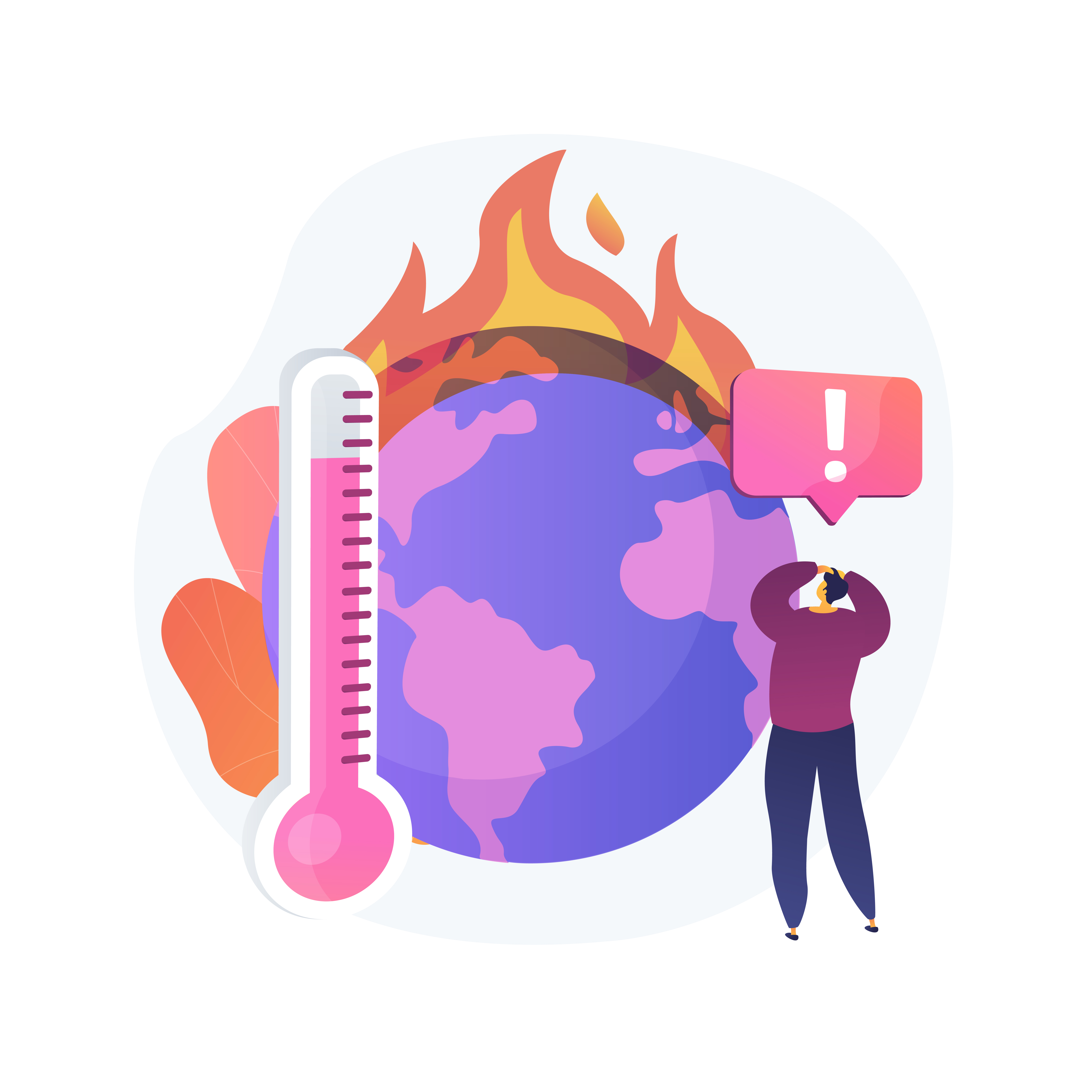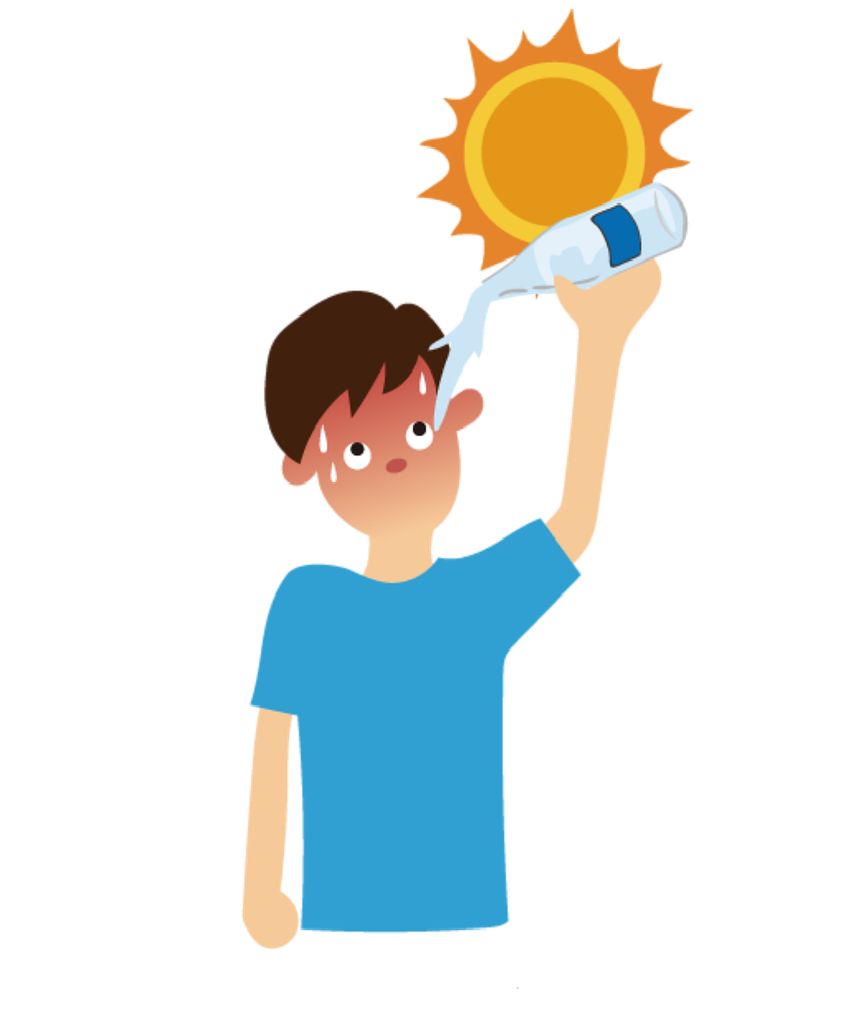Environmental health factors are as important as individual factors in protecting and improving the health of individuals. Climate changes and extreme temperatures have an important place among environmental health factors.
Extreme temperatures bring along a wide variety of health problems. Body metabolism tries to provide the necessary harmony according to increasing temperature and humidity situation. Especially with sweating, body temperature is tried to be maintained. However, sweating is not only sufficient to provide thermoregulation in extreme temperatures, especially in infants, elderly and people with chronic diseases. Again, excessive obesity, excessive fluid loss, using drugs, heart disease and the using some medicine are also factors that affect sweating.
People with coronary diseases such as diabetes and heart diseases, elderly over 65 years of age and living alone, pregnant women, people who work outdoors, individuals in need of care, gamin and homeless people and people who use certain medicine such as depression and sleeping pills are the most at risk.
Protection measures;
Between 10:00 and 16:00, the hottest hours of the day, individuals should not go out unless it is necessary. Individuals who work outdoors should not be unprotected under the sun and should be careful to take watery foods that contain salt frequently. As much as possible light-colored and cotton clothes should be worn, as well as hats and sunglasses outdoor. Individuals should not sunbathe during the hours when the sun's rays are steep and people who want to swim outside of this time should use sunscreen creams with a protection factor of at least 15. Again, heavy physical activities should be avoided in extreme temperatures, morning and evening should be preferred for intense physical activity. Closed areas must be well ventilated; babies, children and pets should never be left in closed and parked vehicles. Take frequent showers so that the body temperature does not rise; where this is not possible, the feet, hands, face and neck should be wetted with cold water or wiped. Regardless of the feeling of thirst, at least 2-2.5 liters of fluid should be consumed every day.

It is essential to drink water for fluid intake although beverages such as milk, ayran and fruit juice should be preferred instead of coffee, tea and carbonated drinks for non-water fluid intake. Instead of drinks containing caffeine; herbal tea milk, fruit juice, linden and rosehip should be preferred since drinks containing caffeine, alcohol and large amounts of sugar can lead to more fluid loss. Very cold and iced drinks should not be preferred as they may cause stomach cramps. There may be exceptional cases where there are fluid restrictions by the physician, depending on the patient's specific health problem or the medications he or she uses. Nutrition should also be taken into account in extreme temperatures; the consumption of fatty foods and deep-fried foods should be avoided; healthy cooking methods such as boiling or cooking in less water should be preferred instead of frying and roasting. Healthy and balanced nutrition is also important within the scope of strengthening the immune system; fresh fruits and vegetables should be consumed in abundance. It is important to pay attention to hygiene conditions in each of the stages of purchasing, preparing and storing food in extreme temperatures. Especially meat, eggs, fish, milk and dairy products, mayonnaise, etc., should not stay in extreme temperatures. Leaving food for a certain period of time poses a risk of food poisoning. Foods should be consumed quickly after being cooked in the summer or should be stored in the refrigerator without being at room temperature for too long. Again, in the summer the consumption of food sold outside and in the open should be avoided.
Heat Stroke: This is seen with the inability to lower the body temperature due to the deterioration of the sweating mechanism as a result of exposure to extreme temperatures is called heat stroke. If heat stroke is not treated early, it can cause permanent damage or death. In the clinical results the skin is dry, red and hot; there is no sweating. it may be accompanied by headache, dizziness, nausea, vomiting, fever has risen above 39.4. It can go up to confusion and coma. In the intervention; the person is taken to a cool and air-flowing place, the tight clothes are loosened, cold application is made, if he or she is unconscious, liquid should not be given to drink and should be taken to the nearest health institution.
 Sunburns:
Sunburns: Sunburns occur as a result of prolonged exposure to sunlight. In the clinical seen, the skin is red, painful and extremely hot. If the individual has blistering, severe pain and fever, or if the patient is under the age of 1, he or she should apply to the nearest health institution. Substances such as yogurt, tomato paste and toothpaste should never be applied to the burned area and water bubbles should not be burst. In sunburns, physician control and medical treatment may be required depending on the lesion. It is important that the lesion is not infected.
The sun's rays have very important positive effects on health for prevention of vitamin D insufficiency, strengthening the immune system and psychological well-being of the individual. However, long-term exposure can also cause harmful effects. Early aging on the skin, skin cancer, sunspots and the formation of cataracts in the eyes can be counted among these negative effects. Knowing that extreme temperatures can cause health problems for the body and knowing the early signs of these problems, taking necessary individual and social health measures is important in preventing possible negative effects.
Reference: https://hsgm.saglik.gov.tr/tr/cevresagligi

 It is essential to drink water for fluid intake although beverages such as milk, ayran and fruit juice should be preferred instead of coffee, tea and carbonated drinks for non-water fluid intake. Instead of drinks containing caffeine; herbal tea milk, fruit juice, linden and rosehip should be preferred since drinks containing caffeine, alcohol and large amounts of sugar can lead to more fluid loss. Very cold and iced drinks should not be preferred as they may cause stomach cramps. There may be exceptional cases where there are fluid restrictions by the physician, depending on the patient's specific health problem or the medications he or she uses. Nutrition should also be taken into account in extreme temperatures; the consumption of fatty foods and deep-fried foods should be avoided; healthy cooking methods such as boiling or cooking in less water should be preferred instead of frying and roasting. Healthy and balanced nutrition is also important within the scope of strengthening the immune system; fresh fruits and vegetables should be consumed in abundance. It is important to pay attention to hygiene conditions in each of the stages of purchasing, preparing and storing food in extreme temperatures. Especially meat, eggs, fish, milk and dairy products, mayonnaise, etc., should not stay in extreme temperatures. Leaving food for a certain period of time poses a risk of food poisoning. Foods should be consumed quickly after being cooked in the summer or should be stored in the refrigerator without being at room temperature for too long. Again, in the summer the consumption of food sold outside and in the open should be avoided.
It is essential to drink water for fluid intake although beverages such as milk, ayran and fruit juice should be preferred instead of coffee, tea and carbonated drinks for non-water fluid intake. Instead of drinks containing caffeine; herbal tea milk, fruit juice, linden and rosehip should be preferred since drinks containing caffeine, alcohol and large amounts of sugar can lead to more fluid loss. Very cold and iced drinks should not be preferred as they may cause stomach cramps. There may be exceptional cases where there are fluid restrictions by the physician, depending on the patient's specific health problem or the medications he or she uses. Nutrition should also be taken into account in extreme temperatures; the consumption of fatty foods and deep-fried foods should be avoided; healthy cooking methods such as boiling or cooking in less water should be preferred instead of frying and roasting. Healthy and balanced nutrition is also important within the scope of strengthening the immune system; fresh fruits and vegetables should be consumed in abundance. It is important to pay attention to hygiene conditions in each of the stages of purchasing, preparing and storing food in extreme temperatures. Especially meat, eggs, fish, milk and dairy products, mayonnaise, etc., should not stay in extreme temperatures. Leaving food for a certain period of time poses a risk of food poisoning. Foods should be consumed quickly after being cooked in the summer or should be stored in the refrigerator without being at room temperature for too long. Again, in the summer the consumption of food sold outside and in the open should be avoided. Sunburns: Sunburns occur as a result of prolonged exposure to sunlight. In the clinical seen, the skin is red, painful and extremely hot. If the individual has blistering, severe pain and fever, or if the patient is under the age of 1, he or she should apply to the nearest health institution. Substances such as yogurt, tomato paste and toothpaste should never be applied to the burned area and water bubbles should not be burst. In sunburns, physician control and medical treatment may be required depending on the lesion. It is important that the lesion is not infected.
Sunburns: Sunburns occur as a result of prolonged exposure to sunlight. In the clinical seen, the skin is red, painful and extremely hot. If the individual has blistering, severe pain and fever, or if the patient is under the age of 1, he or she should apply to the nearest health institution. Substances such as yogurt, tomato paste and toothpaste should never be applied to the burned area and water bubbles should not be burst. In sunburns, physician control and medical treatment may be required depending on the lesion. It is important that the lesion is not infected.